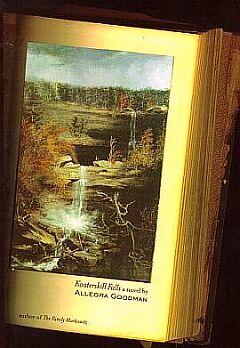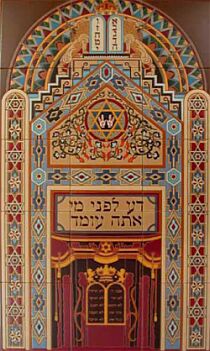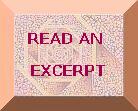«
Kaaterskill Falls
»

Goodman's first novel, Kaaterskill Falls, was published to high acclaim by Dial Press, received the Edward Lewis Wallant Award for Jewish fiction and
was a National Book Award finalist.
Daphne Merkin said in The New York Times that Allegra ''has an almost 19th-century ability to create a sense of linkage, of one existence impinging on the next.''
See Four Paintings of Kaaterskill Falls
Synopsis
"Allegra Goodman's remarkable first novel intertwines the stories of three Orthodox Jewish families, each of whom is tugged between religious tradition and the secular world. The story takes place in the upstate New York town of Kaaterskill, summer Mecca for the tightly knit Kirshner sect. Model wife and mother Elizabeth Shulman pictures her community as a sort of Mont-Saint-Michel, an island both joined and separated from the outside world as if by rising and falling tides. Fascinated with what lies on the spiritual mainland, she hides behind the reassuring rhythms of religious observance, though she's inspired with a "desire, as intense as prayer," to create something all her own."
From any-book.com

Jewish American Pastoral
Allegra Goodman Finds Transcendence in the Catskill Mountains
By ARYEH LEV STOLLMAN
'Kaaterskill Falls," Allegra Goodman's debut novel, is an elegant portrait of Orthodox Jewish life in the modern world, a community-bound life with a rich inner diversity. Set in the late 1970s, the novel takes place mostly in the tiny town of Kaaterskill in upstate New York, where Jews from both non-chasidic and chasidic communities live side by side with local non-Jews from June to August.
In this sober and ultimately compassionate work, the Midat HaDin and Midat Rachamim - the Divine Attributes of Strict Justice and Mercy respectively - hang in a delicate balance. But it is Mercy and even Loving-kindness that win out in the end"....
Read the review at The Foward

Soul-Searching in the Catskills
In a first novel, Allegra Goodman paints a complicated portrait of faith, family and the drama of inner lives.
by Peter Rock
"Goodman, PhD '97, tells the intertwined stories of three families, populating her novel with dozens of characters. But this complexity never dilutes the narrative, and the very unfamiliarity of the setting serves to emphasize the drama in everyday events taking place beneath the surface of this seemingly homogeneous community."
Review at From The Stanford Alumni Magazine

The Promised land
In a first novel rich with feeling, Allegra Goodman is at home in the insular world of orthodox jews
When Allegra Goodman escorted us to the seders and weddings and impromptu dramas of ``The Family Markowitz'' (1996), you could almost smell the fresh challah and old memories contained in those Markowitz dining rooms. The story collection was of such comic charm, such piercing authenticity, that Goodman's portraits of a three-tiered Jewish family had the hues and echoes of a young Grace Paley. Her patriarchs were old leftists who refused to pay taxes; her desultory sons were assimilated scholars, or Anglophile aesthetes who worked for Laura Ashley. The brick and mortar of these stories was their laconic dialogue, capturing decades of humor and regret in a moment's worth of words. Take Rose, the elegantly inelegant matriarch, who is arguing with her son about her financial portfolio days after her second husband's death. ``She stands up and clutches the back of her chair. `I don't want a happier life,' she says with great conviction.''
Read the rest of the Boston Globe Review Here

Finding Wiggle Room in a Strictly Ordered World
Ms. Goodman does a marvelously sympathetic job of conjuring up the circumscribed world of the rabbi's followers, conveying the frustrations and rewards of their intensely religious life. She shows us just how interconnected her characters are, and how momentous the most seemingly ordinary events -- picking a name for a child, deciding to cater a party, becoming friends with a Gentile or nonobservant Jew -- can be in their hermetic world.
As in Ms. Goodman's two accomplished collections of short stories (''Total Immersion'' and ''The Family Markowitz''), the tension between tradition and change, familial responsibility and personal autonomy, continuity and flux provides the motor for her narrative. In fact, her main characters divide into pairs of traditionalists and rebels, ideologues and iconoclasts.
Read MICHIKO KAKUTANI's NY Times review here

The New Jewish Novel
The complaints are very different from Portnoy's
"Another refreshing feature of Goodman's storytelling is that, unlike other members of fundamentalist sects one might find in novels, her characters don't chafe at their restrictions, or not too much. At the beginning of the novel the heroine, Elizabeth Shulman, feels so at home in her Jewish skin that 'God and the scriptures, worship and ritual, are all simple, practical things for her.' Indeed, she's one of the few deeply observant characters you're likely to encounter who 'does not romanticize religion. ... The sacred is not mysterious to her.' Rather, she 'romanticizes the secular. Poetry, universities, and paintings fill her with awe.'"
Read Judith Shulevitz's Review at Slate


From Kaddish to Kaaterskill
American Judaism's New Literary Journey
What are we to make of the Allegra Goodman phenomenon? "Kaaterskill Falls," her recent novel about Orthodox Jewish life in Washington Heights and the Catskills, has set the publishing world on its ear with glowing reviews and a cover story in the "New York Times Book Review." What is most striking about "Kaaterskill Falls" is not only its widely recognized literary quality, but also its lack of angst.
Personally observant, Goodman has written a book about the struggles of an Orthodox community without advocating that traditional observance is either something to be revered or a fate to escape from. The youngest writer at "Writing the Jewish Future," an international Jewish writers conference last February, Allegra Goodman will be honored by the NFJC with a Jewish Cultural Achievement Award in June and may very well be the standard bearer for this generation of Jewish writers.
The ease with which she writes about traditional Jewish life makes her virtually the antithesis of someone like Philip Roth, arguably the definitive Jewish writer of the last generation. While Roth was obsessed with escape, with skewering the American Jewish community and pointing out its flaws in breathless, needle-sharp prose, Goodman's style is tranquil, seemingly at peace with the world of traditional Jewry, despite the tension between orthodoxy and secularism she explores in her book.
Read the rest of Dan Schifrin's January 1999 review

From Hadassah:
"With Kaaterskill Falls, she commits a literary trespass and enters the world of an ultra-Orthodox German Jewish community known as the Kirshners who live in Washington Heights and spend their summers in the Catskill enclave of Kaaterskill Falls. The story encompasses 1976-1978 — artfully chosen because Holocaust memories remain vivid. Goodman focuses on the lives and dreams of three families who struggle to reconcile the conflicts between their observance and the encroaching demands of modernity. Their dying rabbi, Elijah Kirshner, who had the foresight to rescue his community from Nazism, is powerless against the assimilation that assails his brilliant son, Jeremy. Elizabeth Shulman, at 34 the devout mother of five daughters, yearns for a life beyond her circumscribed role. Her seemingly modest ambition is to be the proprietor of a small grocery in Kaaterskill, for which she has the rabbi's authorization. It seems to succeed until she makes an error of judgment and must submit to a harsh rabbinic ruling.

The most interesting character is Andras Malish, a nonbelieving businessman and survivor who lives among the Kirshners trapped by his spiritual inertia.
Goodman's attention to religious trivia (Elizabeth loses her shop because she caters a party using cake from a kosher bake shop not under Kirshner's supervision) and to the community's narrow perception of life (excursions to a Shakespeare play and the town library involve contorted justification) does not shadow her recognition that the life of the Kirshners is indeed painfully vulnerable.
Goodman's characters are entrapped in a microcosm of Jewish history. The author's empathy invigorates Kaaterskill Falls as she reveals the self-contained world with humor and tenderness."
from Hadassah.org

OTHER REVIEWS
Something is happening in 'Kaaterskill Falls,'
BY DIMITRI DROBATSCHEWSKY
Special to the Jewish News
COMMENTARY REVIEW
By Ruth R. Wisse
SALON REVIEW
By Laura Green

QUOTES
"Eloquent ... Kaaterskill Falls ratifies the achievement of the author's short stories, even as it announces the debut of a gifted novelist."
-- The New York Times
"A richly textured portrait ... not since Chaim Potok's The Chosen have readers been treated to such an intimate look at a closed Orthodox community."
-- Los Angeles Times Book Review
"A carefully observed and haunting novel ... Like the late Nobel laureate Isaac Bashevis Singer, Goodman wrings ineffable strands of passion from the quietest of hopes and disappointments."
-- People
"A writer of uncommon clarity and grace ... Goodman's handling of incident is masterly."
-- The New Yorker



|
|
|